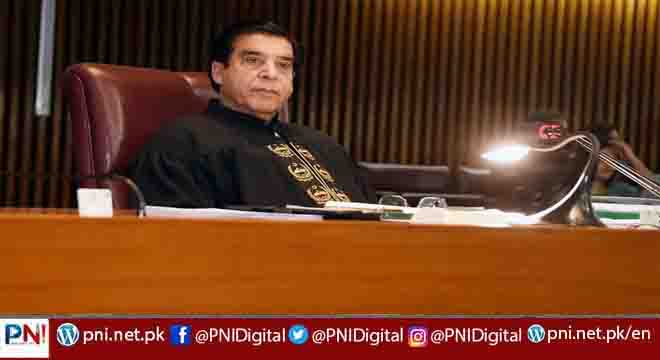ISLAMABAD, Apr 26 (APP): National Assembly Speaker Raja Pervez Ashraf on Wednesday said all state organs should work together to uphold the Constitution, protect democratic values, and maintain the constitutional order in order to “avoid confrontation and ensure that the people’s interests are best served”.
“The National Assembly is deeply concerned about recent decisions and comments made by some judges of the Supreme Court, and urges the court to refrain from getting involved in political matters and to respect the legislative domain of Parliament,” the speaker said in a letter addressed to the apex court.
Raja Pervez Ashraf said the National Assembly “is disappointed with the Supreme Court’s three-member bench’s warning to the Federal Government about the approval of Rs 21 billion expenditure, which could result in severe consequences. This action is considered an assault on the National Assembly and the constitutional order. Such a directive constitutes an unacceptable infringement on its exclusive jurisdiction and authority and a violation of its privileges.”
Article 73 of the Constitution, he said, “confers exclusive powers related to Money Bill on the National Assembly. Additionally, the authority to approve expenditure from the Federal Consolidated Fund is granted to the elected members of the National Assembly under Articles 79 to 85.”
The speaker said:”Regrettably, the orders of the 3-member Bench have disregarded both the constitutional process and the National Assembly’s authority regarding financial matters. The Bench seems to be in a rush and has given extraordinary directions to the Federal Government to sanction the expenditure of Rs. 21 billion from the Federal Consolidated Fund, thereby presenting it to the National Assembly as a fait accompli. If the National Assembly subsequently rejects this amount, as seems likely, the court-ordered authorization would be unconstitutional, which would have negative consequences for the Federal Government.
“The National Assembly notes with great concern that despite knowing the consequences and effects of such prior authorization, which will be rejected by the National Assembly when presented for ex-post facto approval, the 3-member Bench of the Supreme Court has threatened the Federal Government of `serious consequences’ for not authorizing the expenditure of Rs. 21 billion. This, the National Assembly notes with great dismay, is an attempt to undermine the National Assembly and amounts to breakdown of the constitutional order. The National Assembly is quite clear that such direction is an impermissible intrusion into the exclusive jurisdiction and authority of the National Assembly, and a breach of its privilege.”
The speaker said the constitutional courts had the power to interpret the Constitution however, “such power does not include rewriting the Constitution or undermining the sovereignty of the Parliament.
“It is not the prerogative of the 3-member Bench of the Supreme Court to give directions for release of funds while ignoring the constitutional provisions, which the Hon’ble Judges have taken oath to preserve, protect and defend.
“The National Assembly firmly believes that the power of the purse belongs solely to the National Assembly, comprising of the directly elected representatives of the people of Pakistan. The National Assembly shall defend this right and prerogative granted to it by the people and the Constitution. Any attempt to circumvent and sidestep the constitutional mechanism and due process shall be repelled by the National Assembly.”
He said the National Assembly was deeply concerned about the recent orders issued by a three-member Bench of the Supreme Court on April 14 and 19, 2023, instructing the State Bank of Pakistan and the Finance Division, Government of Pakistan to release Rs 21 billion to the Election Commission of Pakistan, despite its “explicit prohibition on such allocation”.
“These orders were issued in disregard of the National Assembly’s resolution dated April 6, 2023, which declared the decision in SMC No. 1/2023 and CPs No. 1 and 2 of 2023, passed by a majority of 4-3, as dismissing the SMC and CPs. Consequently, CP No. 05/2023 was deemed inadmissible, and the decision of April 4, 2023, has no legal force or binding effect.
“As per the Constitution of the Islamic Republic of Pakistan, Article 73 vests the power to deal with Money Bills solely in the National Assembly, and Articles 79 to 85 give authority to elected members of the National Assembly to approve expenditure from the Federal Consolidated Fund, which necessitates the National Assembly’s exclusive control over the allocation and release of funds.
“For present purposes, I draw your attention to Article 73 of the Constitution of the Islamic Republic of Pakistan (Constitution), which vests powers related to Money Bill exclusively in the National Assembly.
Articles 79 to 85 confer power and authority to approve expenditure from the Federal Consolidated Fund on the elected members of the National Assembly.
“The National Assembly is deeply troubled by the recent orders of the 3-member Bench of the Supreme Court, dated 14-04-2023 and 19-04-2023, directing the State Bank of Pakistan and Finance Division of the Government of Pakistan to release Rs. 21 billion to the Election Commission of Pakistan. This is in direct violation of the National Assembly’s express prohibition on such release.
“Keeping in view these unambiguous constitutional provisions and division of powers and functions, I write to convey the profound concern and deep unease of the National Assembly with the orders passed by a 3- member Bench of the Supreme Court, on 14-04-2023 and 19-04-2023, directing the State Bank of Pakistan and Finance Division, Government of Pakistan to allocate/ release Rs 21 billion to the Election Commission of Pakistan.
These orders have been passed notwithstanding that such release has expressly been forbidden by the National Assembly. While doing so, with great regret, the 3-member Bench of the Supreme Court has ignored the resolution of the National Assembly dated 06-04-2023 resolving that the decision, in SMC No. 1/2023 and CPs No. 1 and 2 of 2023 passed by a majority of 4-3, had dismissed the SMC and CPs. Thus, CP No. 05/2023 was not maintainable and as such, the decision dated 04-04-2023 has no force of law or has any binding effect.
“On 10-04-2023, the National Assembly refused to pass the Charged Sums for General Elections (Provincial Assemblies of the Punjab and the Khyber Pakhtunkhwa) Bill, 2023, where under a charge was sought to be created on the Federal Consolidated Fund for Rs. 21 billion, under Article 81(e) of the Constitution.
“On 17-04-2023, the Standing Committee on Finance and Revenue of the National Assembly, directed the Finance Division to seek prior approval of the National Assembly, in order to avoid constitutional violation for this unauthorized expenditure, because the National Assembly would have rejected ex-post facto approval for Rs. 21 billion demand for supplementary grant as other expenditure, keeping in view the foregoing position of the National Assembly.
“Finally, as the Speaker of the National Assembly and the custodian of the House, I invite your collective attention to the following:
“The National Assembly believes that since SMC No. 1/2023 and CPs No. 1 and 2 of 2023 were dismissed by a majority of 4-3, therefore, the so-called `3¬2′ decision has no legal force. As such, the orders dated 04-04-2023, 14-04¬2023 and 19-04-2023 passed in CP No. 05/2023 and various CMAs have no legal force. Therefore, they neither enunciate a principle of law nor are to be implemented in terms of Articles 189 and 190 of the Constitution.
“Notwithstanding the foregoing, the rejection of Rs. 21 billion, either as a charged sum or as other expenditure through supplementary grant, by the National Assembly does not constitute loss of confidence of the National Assembly in the Federal Government or the Prime Minister. The rejection of Rs. 21 billion is based on the understanding of the National Assembly that the orders of the 3-member Bench dated 04-04-2023, 14-04-2023 and 19-04- 2023 are in violation of a 4-3 majority decision in SMC No. 1/2023 and CPs No. 1 and 2 of 2023.
“We have always believed in the principle of separation of powers, and the Parliament has always respected the independence of the Judiciary. However, it is important to remember that each Branch has its own domain and should not encroach upon the powers of the other. I am also to convey to you the sense of the House that an unnecessary confrontation, deeply damaging to the national interest, is being created by the repeated orders to release funds to the Election Commission of Pakistan, disregarding the express will of the National Assembly. The National Assembly will approve the expenditure for the general elections to all the assemblies (National and four Provincial) in the annual budget (statement) for the next financial year, presented by the Federal Government, in due course.
“It has been 50 years since the adoption of the Constitution and during this time, we have witnessed numerous encroachments upon the powers of the Parliament by the dictators. The higher judiciary has, and sadly so, mostly ratified the undemocratic interventions. However, the people of Pakistan have always fought back, struggled for the restoration of democracy, with their blood and sweat and have always prevailed. They also strived for the establishment of an independent Judiciary. However, unfortunately, the judiciary mostly trained its gun towards the same politicians who defended it during difficult times. Forgetting that it is the politicians and parliamentarians of the All-India Muslim League who struggled and won independence. The Objectives Resolution unambiguously declares the supremacy of the Parliament, in accordance with the vision of the Quaid e-Azam. By virtue of Article 2A, the Objectives Resolution is now a substantive part of the Constitution, which, inter alia, states “wherein the State shall exercise its power and authority through the chosen representatives of the people”. Therefore, neither the Executive nor the Judiciary can encroach upon the powers of the National Assembly. Directing the Executive to authorize expenditure from the Federal Consolidated Fund and seek ex-post facto approval from the National Assembly, in the circumstances where the National Assembly has repeatedly rejected this demand, militates against the trichotomy principle embedded in our Constitution.
“The Supreme Court must, as far as possible, avoid getting involved in political thicket. It is best to leave resolution of political matters by the Parliament and the political parties.
“I, on behalf of the National Assembly of Pakistan, urge the Chief Justice and Judges of the Supreme Court, individually and collectively, to exercise restraint and respect the legislative domain of the Parliament. We must work together to uphold the Constitution, protect the democratic values and work within our respective constitutional domains to ensure that confrontation between the organs of the State is avoided and the constitutional order is maintained.”
Follow the PNI Facebook page for the latest news and updates.







